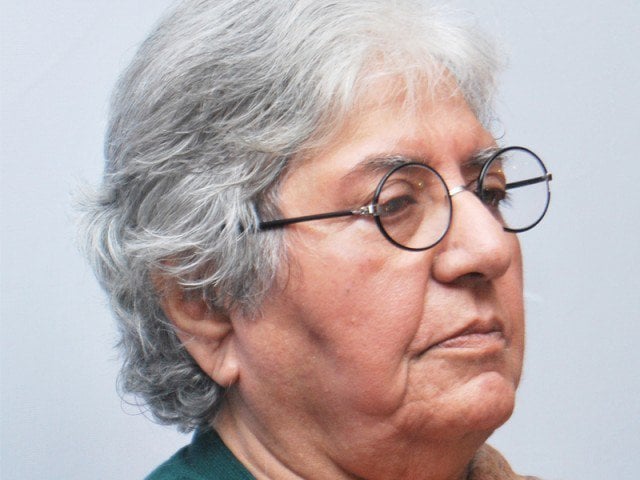
The people, who came to Sindh after One Unit, should not have citizenship rights, particularly the right to vote – Dr. Hamida Khuhro
[Translator’s note: This is a translation of renowned historian Dr. Hamida Khuhro’s comprehensive interview, originally published in the Sindhi magazine Nao Niapo, Karachi in May, 1986. The interview panel consisted of Advocate Masood Noorani (MN), Journalist Nasir Aijaz (NA) and Faqir Muhammad Lashari (FM), with Mansoor Qadir Junjo’s assistance to the interviewers. Masood Noorani also contributed observation notes from his initial meeting with Dr. Khuhro, which were used as a preamble to the interview. The interview was later included in an anthology that contained interviews of Dr. Khuhro, published in various Sindhi newspapers and magazines.
In 2021, Dr. Hamida Khuhro Foundation, Sindh (Karachi-Hyderabad) published Nao Napo magazine’s interview as a separate booklet with a title of ‘Tareekh Ji Amhon Samhon’ (Face-to-Face with History). The booklet includes a preface by Mansoor Qadir Junejo. Zaffar Junejo]
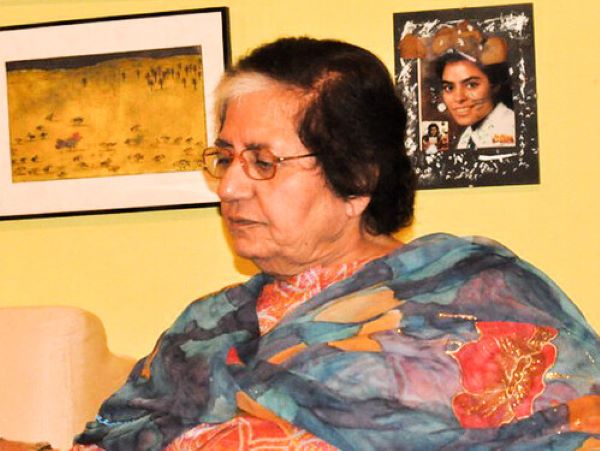 Baloch claim on certain parts of Sindh is their foolishness. What Ghous Bux Bezanjo said shows his unawareness of history. It is highly rubbish plan – Dr. Hamida Khuhro
Baloch claim on certain parts of Sindh is their foolishness. What Ghous Bux Bezanjo said shows his unawareness of history. It is highly rubbish plan – Dr. Hamida Khuhro
FM: You discussed parity, but the real threat is the continuous influx of outsiders to Sindh. If it continues, Sindhis will soon become a minority.
HK: That’s why we are striving to achieve parity before we become the minority.
NA: Along with parity, outsiders should be expelled. Not long ago, Imdad Muhammad Shah also floated the idea that “people settled in Sindh after the One-Unit should go back.”
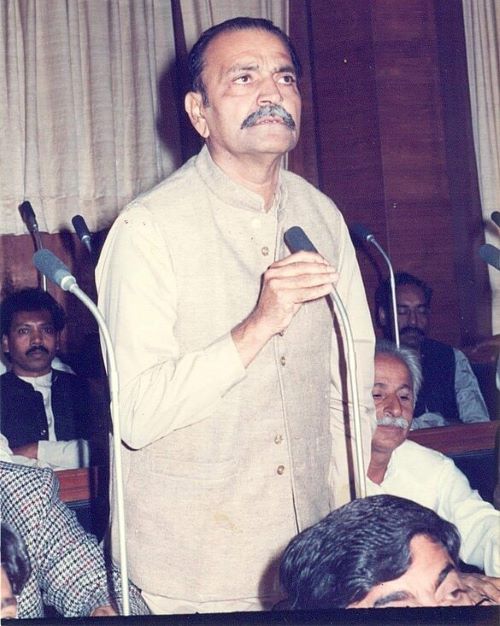
HK: In this regard, I have prepared a list of 15 points. It is preliminary and not finalized. Some political parties believe that people who arrived in Sindh after 1952 should be expelled. However, we support the cut-off line of the One-Unit. Therefore, we believe that those people should not have citizenship rights, particularly the right to vote. Voting is an important point. The voting barrier would help Sindhis elect their representatives. But we think it is important to get constitutional guarantees. At the same time, we need to keep an eye on the issue of domicile. We should act responsibly and play our role. Undoubtedly, there is some pressure from the students, but we need a national pressure similar to that of the Bengalis. For example, if there had been a call in Bengal for a “Pen-down,” all people volunteered to remain in their homes, and offices were deserted. We are trying to make Sindhis aware and expect them to act like Bengalis.
NA: Now another issue has been raised in PNP’s (Pakistan National Party) newly released document. It suggests that some parts of Sindh should be added to the territory of Balochistan. The document claims areas where Balochs are in the majority. For instance, a part of Jacobabad and roughly half of Karachi has been claimed. What is your opinion about it?
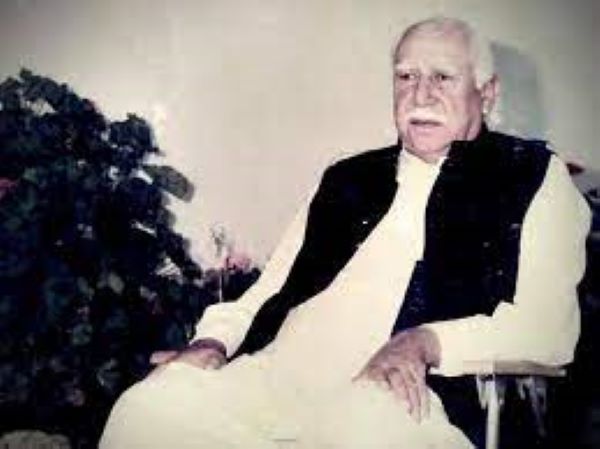
HK: I think it is a big foolishness on their part. Baloch in Sindh is considered a surname, and apart from Jacobabad, they also live in other parts of Sindh. She looked at FM and said, “See, a Baloch is among us,” and asked him, “Do you consider yourself Sindhi or Baloch?” FM responded confidently, “Pako (confirmed), Sindhi.” What Ghous Bux Bezanjo has said shows his unawareness of history. Anyway, we shouldn’t fight with Balochistan. We see them as our ally in future struggles. Historically, Balochistan has supported us – from weapons to military bands. Sindh is their food basket. They have exploited the border towns of Sindh to fill their bellies, and even through peaceful means, they have gained a lot from Sindh. We cannot separate Sindhis and Balochs. (She recalls Ghaus Bakhsh Bizenjo’s claim over some parts of Sindh). She sarcastically utters, “It is their highly rubbish plan.”
We are trying to make Sindhis aware and expect them to act like Bengalis
NA: What is your opinion about the Babak Karmal Government?
MN: Means, how do you look at the whole issue of Afghanistan?
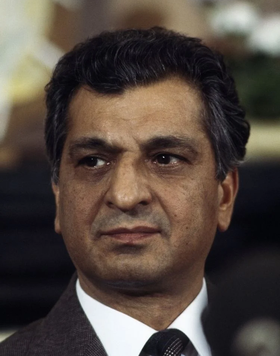
HK: The expansion of Russians towards Afghanistan is a historical issue. They reached Samarkand and Bukhara, and during the English times, they reached the banks of the Oxus River. However, when the British Empire ended in India, it left a void. Now we could say that in terms of global politics, there existed a political space at the subcontinent or regional level. Presently, India is not too strong, and Pakistan is a weak state. On the other hand, Iran is unstable. So, at the regional level, there was a gap or space that needed to be filled. However, Russian expansion has continued since the times of Catherine the Great, and the present situation is also part of that scheme. Now, whatever explanations are put forward or argued – warm water, the Gulf, or whatever other reasons – all these explanations are temporary. Some believe that Afghanistan will withdraw its army or it will leave it. It is a state of self-delusion. We shouldn’t forget that Afghanistan or some areas of it have been under the influence of Russia. So, Russia may withdraw its military, but it would retain its interest in the form of retaining some advisors in Afghanistan. In that situation, it would be better for Pakistan to directly contact Russia, realizing the dynamics of being a small neighbor and a big neighbor. Another question arises: on what basis we are in fight with the Kabul Government. On the contrary, we also lack democracy, and American presence in Islamabad. We are not free and independent in our decisions. If America decides that there should be democracy in Pakistan, then we would see some form of democracy (she giggles). However, as neighboring countries, we should live peacefully. Now Sindhis have to decide whether friendship with Russia would be beneficial for them or not? (She laughs again) But Russian presence in Afghanistan has stuck in Pakistan’s throat like a big thorn.
Sindhis have to decide whether friendship with Russia would be beneficial for them or not?
MN: What are your views about the Sikh Movement? A group of scholars terms it as a true and representative nationalist movement, but another group calls it an American-supported movement. What is your opinion?
FM: What should our attitude be towards that movement?
HK: First of all, India has to accept that it is home to various nations. It means that all of them have historical rights, including full autonomy. However, compared to Pakistan, India has a good track record. You may recall that there was an independent movement in Madras; their movement was against the Hindi language. But Nehru granted them rights, diffusing the movement, and now Madras does not claim independence. Likewise, in Assam, there was a movement, but their issues were addressed before the election. The situation has been calm up until now. However, the issue of Sikhs is a bit complicated. It is an orthodox movement, a religious movement. But until today, India has failed to resolve it. Some relief has been provided to Sikhs, but Sikhs are not easily molded, so their struggle will take some time to be settled. But I don’t see the establishment of a Khalistan State. However, there are chances that Sikhs may gain more provincial autonomy. It may be because Hindus and Punjabis also live there, particularly in Haryana, and their opinions are quite different from the radical Sikhs. Therefore, I am of the view that Khalistan is an impossible dream.
FM: Recently, America has attacked Libya. What is your opinion about it?
HK: (She laughs) First of all, we should resolve our own issues. (She becomes serious) Surely, the attack on Libya is open aggressiveness. However, it is obvious that the American role in the Middle East has been pro-Israel.
MN: Please tell us about the situation in Sri Lanka. We want to hear your opinion and print it so that Sindhi people can know your point of view.
HK: The issue of Sri Lanka has gained a lot of popularity as well as concern. One reason is the interference of neighboring countries. Until now, Tamils have relied on that country. Sri Lanka is an example for all of us. It teaches us how they initially ignored the issues of the people, failed to grant them compensation or opportunities, and lacked passion or statesmanship. The current situation is quite challenging for the Sri Lanka Government. It seems very complex to me. Tamils have reached the highest level of extremism. However, India has a role to moderate them and influence them to halt the escalated war. Otherwise, the situation would be beyond the control of the Sri Lankan government.
MN: Is there any role of America in the Tamil issue?
HK: Yes, America is involved. In fact, it supports the Sri Lankan government. But it is not effective support; it is merely lip service. On the other hand, Tamil activities have spread, and they have launched a guerrilla war. In that particular situation, America has totally failed. No one is there to halt the Tamils. Although along with American military, Israel’s military is also present in Sri Lanka, the Tamils seem unbeaten.
MN: (Smiling and gazing at Dr. Haleem Qazi) Now, if you allow, I have a small personal question to ask, please?
HK: Welcome.
MN: Generally, after marriage, women are known by the name of their husbands or their husbands’ surnames, and this trend is particularly followed by women leaders. For example, Indira was the daughter of Nehru, but after marrying Feroz Gandhi, she became Indira Gandhi. Similarly, Nusrat Bhutto, and Khalida Zia and Sirima Ratwatte Bandaranaike also continued that tradition. But contrary to the prevailing tradition, you have retained your father’s surname ‘Khuhro’. Does that indicate your strong attachment to your father?
HK: No, it was not planned. (She speaks in English). Even before marriage, being a teacher, I was well known as Hamida Khuhro.
MN: (Laughs). It would indeed seem strange to call you Hamida Qazi! Wouldn’t it?
HK: (She laughs) Yes, but I kept my surname Khuhro with my name because many of my books and publications carried that name – ‘Hamida Khuhro’. In fact, my academic career was established with that name. Therefore, I retained it. So, it was not a well-thought-out or planned decision. It just happened that way. Anyway, Islam also allows women to carry their fathers’ names. For example, X bint Y, etc.
We should all remember Maududi’s words when Fatima Jinnah participated in the election. He said, “It is okay, Islam accepts women’s leadership.”
MN: Now, the issue of women’s rights has arisen. So, I would like to hear your opinion about current legislation regarding women. For instance, there is a debate about whether the testimony of two women is equal to that of one man. What is your opinion on this?
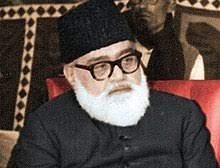
HK: All such legislation and similar laws have been aimed at keeping women backward. On the other hand, in Islam, there are laws that can be interpreted differently. It means that you can define Islamic law according to whatever you want to establish. In that context, there is an English saying: “The devil can quote Scriptures for his own ends.” In that sense, the Quran can also be defined in various ways and interpretations. However, we should not forget that the history of the subcontinent has been reform-oriented. Some thinkers have supported women’s rights and believed that in the future there would be more reforms and women would be liberated – Islam would be defined in a modern way. But in the past eight years through various means including legislation women have been pushed back – and it has been established that “women are not equal to men; women cannot perform like men.” We should all remember Maududi’s words when Fatima Jinnah participated in the election. He said, “It is okay, Islam accepts women’s leadership.” But now, followers of Maududi advocate that “women cannot be leaders.” Their stance goes against the demands of history. Simply put, it is injustice – women leaders are accepted in Christianity, Hinduism, and Buddhism – but a woman leader is not accepted in Islam. It means Islam is backward and too orthodox compared to other religions.
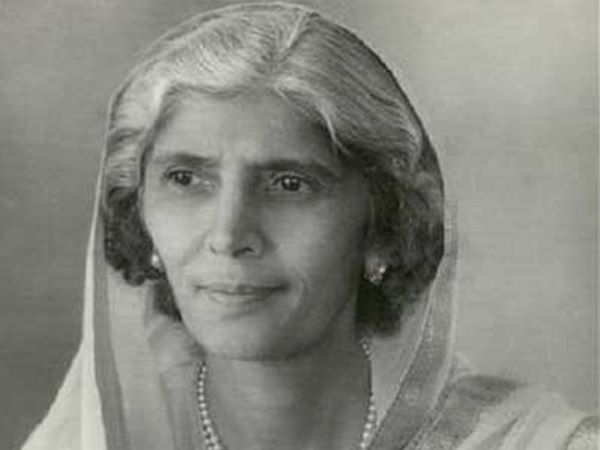
MN: What is your opinion about the interpretation of the Quran?
HK: As I mentioned earlier, it is up to you how you define or interpret the Quran. You can even prove that alcohol is allowed and also prove that it is prohibited.
The powerful groups intend to make us slaves, want us to be uneducated and illiterate, and keep our universities closed
FM: Madam, I have one question. Presently, students are unable to prioritize their education. They are more inclined towards violence. This situation has created adverse socio-political circumstances. In East Bengal (now Bangladesh), students participated in politics, but they also focused on education and never neglected their academic responsibilities.
HK: Yes, it is a national issue, the most important and highly prioritized. Earlier, we discussed the issue of healthcare, but education is even more important. However, it is rarely discussed or debated. The powerful groups intend to make us slaves, want us to be uneducated and illiterate, and keep our universities closed. On the other hand, other universities have closed their doors to us for admissions – the universities where we could have sought admission – even the NED University and Dow Medical University don’t allow us to get admission. Therefore, students need to realize that they have to seize whatever opportunity they have to obtain an education.
MN: (He gets up and requests to leave) Thank you very much. (All his team members stand up and also request to leave)
HK: (She smiles graciously) No need to mention it. I am also thankful to you. (Concludes)
Click here for Part-I and Part-II (Preamble) – Part-!II , Part-IV , Part-V , Part-VI , Part-VII , Part-VIII , Part-IX, Part-X, Part-XI, Part-XII, Part-XIII
_____________________
 Dr. Zaffar Junejo is a historian and a writer, having earned Doctorate from the Department of History University of Malaya, Malaysia. Presently, Mr. Junejo is associated with the European University Institute, Florence, Italy. Apart from scholarly contribution, he also writes for popular media. He could be accessed at: Email junejozi@gmail.com, Cell/WhatsApp +92 334 045 5333 Skype Zaffar.Junejo Facebook facebook.com/zaffar.junejo
Dr. Zaffar Junejo is a historian and a writer, having earned Doctorate from the Department of History University of Malaya, Malaysia. Presently, Mr. Junejo is associated with the European University Institute, Florence, Italy. Apart from scholarly contribution, he also writes for popular media. He could be accessed at: Email junejozi@gmail.com, Cell/WhatsApp +92 334 045 5333 Skype Zaffar.Junejo Facebook facebook.com/zaffar.junejo